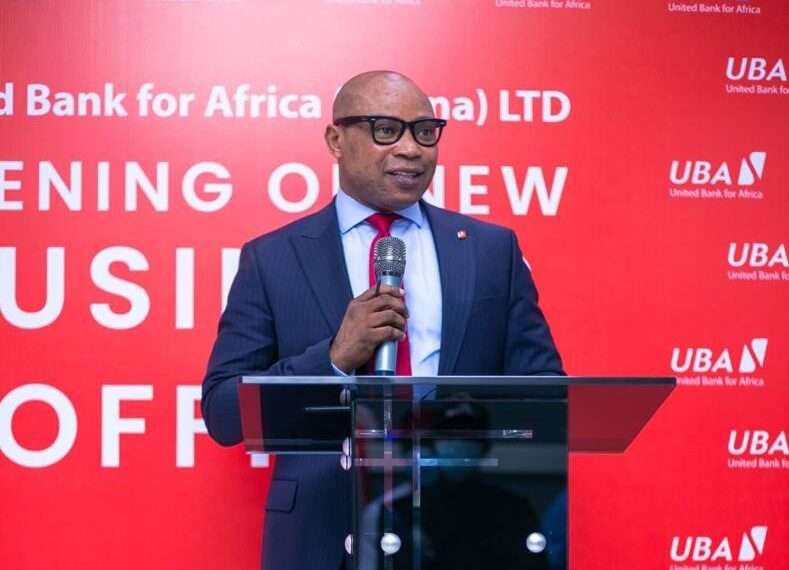Fitch Ratings, an International Ratings Agency, has downgraded United Bank for Africa (Ghana) Limited’s Long-Term Issuer Default Rating (IDR) to ‘B-’ from ‘B’ with a stable outlook and Viability Rating to ‘b-’ from ‘b’.
Published today, January 18, 2022, the rating action followed Fitch’s downgrade of Ghana’s Long-Term IDRs to ‘B-’ from ‘B’.
The renowned rating agency indicated the withdrawal of the previous Support Rating for UBA Ghana “as it is no longer relevant to the agency’s coverage following the publication of its updated Bank Rating Criteria on November 12, 2021. In line with updated criteria, we have assigned a Shareholder Support Rating (SSR) of b-”.
According to Fitch, the Shareholder Support Rating hinges on the high likelihood for UBA Plc to provide support to UBA Ghana, given it’s importance to the group’s pan-African strategy and its substantial contribution to group net income (10% in H1 2021).
In addition to this, Fitch considers the 91% ownership, common branding and high level of management and operational integration between UBA Ghana and the wider group.
Nonetheless, the extent of support from UBA Plc’s is conditioned by its “standalone creditworthiness,” as captured by its Long-Term IDR.
“We also consider there to be a risk of regulatory restrictions in Nigeria, particularly concerning foreign-currency flows out of the country, which may constrain UBA Plc’s ability to provide timely and sufficient support.”
Fitch
On the grounds of Viability Rating, the downgrade of UBA Ghana follows the downgrade of Ghana’s Long-Term IDRs, “as the bank does not meet Fitch’s criteria to be rated above the sovereign on a standalone basis,” Fitch said.
UBA to Remain Insolvent in Sovereign Default Scenario
Fitch believes that UBA Ghana is unlikely to remain solvent in a sovereign default scenario, due to the concentration of its operations within Ghana, reliance on sovereign-derived income and high exposure to the sovereign relative to capital, primarily through local-currency government securities (over 300% of common equity Tier 1 (CET1) capital at end-September 2021).
UBA Ghana has a small market share of Ghanaian banking sector assets (3% at end-September 2021), but its franchise benefits from being a subsidiary of UBA Plc. Fitch expects market shares to increase moderately over the next two years as UBA Ghana pursues an aggressive growth strategy.
Also, single-borrower credit concentration is high, with the bank’s 20 largest loans representing 86% of gross loans at end September 2021 (although equivalent to just 87% of equity, due to UBA Ghana’s large capital base and a low share of loans in total assets).
“Our risk profile assessment also considers aggressive loan growth that may lead to seasoning risks in the event of a relaxation of underwriting standards”.
Fitch
UBA Ghana’s impaired loans (Stage 3 loans under IFRS 9) ratio (40% at end-September 2021) is extremely high, reflecting exposure to several downstream oil companies that have struggled to service their debt due to delayed government payments.
However, the loan book represents a small proportion of total assets (22% at end-9M21), with Ghanaian local-currency government securities representing over 50% of total assets. Fitch also expects the impaired loans ratio to decline in the short term as a result of write-offs, the resolution of some sizeable impaired loans and strong loan growth.
Again, UBA Ghana has strong profitability, as indicated by operating returns on risk-weighted assets (RWA) that have averaged 10% over the four years, Fitch said. Profitability is underpinned by Ghana’s high interest rate environment but earnings are highly reliant on interest income from government securities, which represented 66% of total interest income in 2020.
Fitch further highlighted that the Bank’s reliance on non-deposit funding is limited (2% of total funding at end-September 2021). Also, term deposit funding is moderate (18% of customer deposits) but depositor concentration is particularly high, with the 20 largest depositors representing 49% of customer deposits.
However, Fitch noted that large holdings of government securities and bank placements (equivalent to over 90% of total funding) ensure strong liquidity coverage that compensates for high depositor concentration.
READ ALSO: Fitch Downgrade GTB Ghana to ‘B-’ With a Stable Outlook























